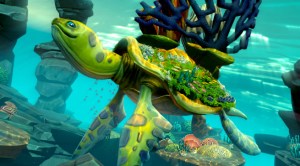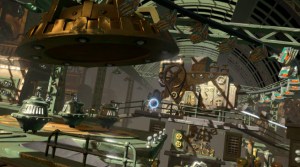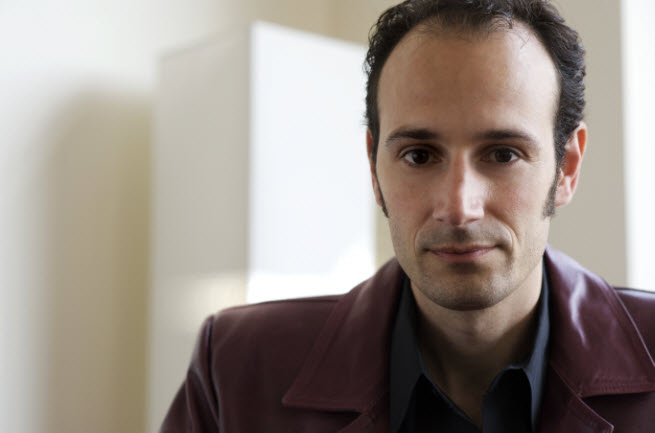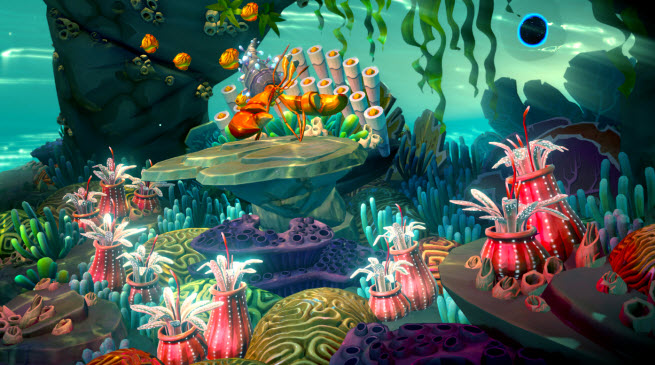Harmonix Music Systems and Disney Interactive are collaborating on Disney Fantasia: Music Evolved in an attempt to create the next big thing in music games. We’ve all had our turn at Guitar Hero and made fools of ourselves with Dance Central on Kinect, and now he wants us to play this “breakthrough musical motion” game when it debuts on Microsoft’s consoles in 2014.
We saw a preview of the title. And one of the pioneers behind this music-game strategy is Alex Rigopulos, who cofounded Harmonix in 1995. In an exclusive interview, Rigopulos told us that musical creative will be the next big wave, and Disney’s Fantasia is the way you into it Rigopulos hopes it will be as successful in ushering in a new era of music games as Harmonix’s Dance Central was in 2010 when it debuted on Microsoft’s Kinect motion-sensing system for the Xbox 360.
Fantasia is a beloved 75-year-old film with eight memorable vignettes set to classical music. The most iconic of those is a dream sequence with Mickey Mouse as The Sorcerer’s Apprentice, conducting music across the heavens and the seas. If you are expecting to see Mickey Mouse in this game, conducting classical music against the backdrop of the Fantasia movie, you couldn’t be further away from what Harmonix is trying to do with this game. At least that’s our impression from what we have seen so far.
Disney’s Fantasia will be an exclusive on Microsoft’s Xbox One and the Xbox 360 next year. Here’s an edited transcript of our interview with Rigopulos.
GamesBeat: I saw Disney’s Fantasia during judges’ week. I’d had the early word you were working on a Fantasia game, and I got in my head that it would be something like Mickey Mouse, Fantasia cartoon images, and classical music. What I actually saw was surprising.
Alex Rigopulos: When we started working on the project, we went a lot further than the film itself. We looked at Walt’s original production notes when he was conceiving the film. We never wanted to make a game of the movie. We wanted to look at what Walt’s creative ambitions for the film were and update those for a modern rendition.
GamesBeat: So you never started with just re-creating that cartoon world, Mickey Mouse as the conductor and that sort of thing.
Rigopulos: Of the eight vignettes in the original film, the one that was the most directly inspirational to us was “The Sorcerer’s Apprentice.” The most iconic and enduring image from that vignette is the dream sequence, with Mickey on the cliff conducting the heavens and the sea and the weather in sync with the music. For us, that was an important creative inception point for this project.
GamesBeat: How long have you been working on Fantasia now?
Rigopulos: About two years at this point. The origin of the project is interesting. Coming off the launch and success of Dance Central, there was a lot of creative excitement at the studio about motion control and music and the meeting between the two. We were doing a lot of brainstorming and prototyping about how to combine motion control with music, and in particular with musical creativity, which has been a long-term interest for us. We were actively engaged in development of new music and motion ideas.
It’s a great serendipity that we were approached at that time by Disney. At first, we weren’t terribly receptive, because we don’t usually work with third-party IP. But we took the meeting, and the moment they said “Fantasia,” it was a lightbulb going on for us. That was a perfect brand vessel for the creative experience we were already building.
 GamesBeat: Did you start changing what you had, then, because of all the things you could bring into it from Fantasia?
GamesBeat: Did you start changing what you had, then, because of all the things you could bring into it from Fantasia?
Rigopulos: The particular thing that Fantasia brought to the table was a narrative conceit – the player as The Sorcerer’s Apprentice, inhabiting a world where music and magic were one. Manipulation of the natural world through magic and the manipulation of music itself were woven into a single act. That was a narrative conceit that we found really powerful. It was a great framework for what we were trying to achieve.
GamesBeat: Disney: Fantasia is coming out 2014. Is it safe to say you have next-generation technology you’re going to be able to take advantage of?
Rigopulos: Yeah, that’s safe to say. We will be releasing the game initially on both the Xbox 360 and Xbox One.
GamesBeat: You must be excited about what you can do with Kinect now.
Rigopulos: Already, with the existing Kinect, we’re able to do a tremendous amount. There’s a surprising degree of precision in the original Kinect that we’re taking advantage of in new ways. With the new Kinect in the Xbox One, it takes it to a whole new level. There’s all manner of ways in which we’re looking to exploit that in the service of creative expression on the part of the player.
GamesBeat: The interesting thing to me is that music always seems to require reinvention in the gaming space. You have things like Call of Duty that can stay the same every year, but music goes through these cycles where something booms, and then it gives way to something else. Rock Band and Guitar Hero gave way to the dance games. Are you accustomed to that at this point?
Rigopulos: Yeah, by necessity. I think it parallels the evolution of music itself. Music is undergoing constant reinvention. At Harmonix we see it as our creative responsibility to be constantly reinventing music play. So of course, what a music game meant in the Rock Band days was instrumental performance simulation. Subsequent to that, it was all about dance, which connects people to music and to each other in a primal way. Now, with Fantasia, we’re going after musical creativity, trying to bring physical creative expression with music into gaming for the first time.
 GamesBeat: Does it seem like fans reach a limit, where they embrace something as a trend for a while and then at some point they give it up?
GamesBeat: Does it seem like fans reach a limit, where they embrace something as a trend for a while and then at some point they give it up?
Rigopulos: Players have an appetite for innovation. There will be a period of time where something new comes along and they’ll happily devour that. Then they’re thirsty for something new. We feel pretty excited about the level of innovation that we’re bringing to the table.
GamesBeat: What are some of the things that give it this touch of innovation, then?
Rigopulos: The most important, as I’ve already touched on, is the creative element. First off all, there’s the fusion of physical motion and musical interaction. Beyond the dance games, this isn’t something that’s been done before. We’re giving players several axes of meaningful musical expression through the gameplay. That’s been a long-time dream of ours, and it’s never been done successfully in music games.
GamesBeat: It seems like there’s a larger trend, too, where people are not as satisfied being consumers anymore, passive participants in a game. They want to be creators. That sounds like something obvious or easy to do, but I take it that figuring out exactly what you want the user to create is the hard part.
Rigopulos: The challenge is in fusing musical creativity with gameplay. Gameplay is all about objective criteria for success and failure. Creativity, on some level, is about letting people do things that are their own, that are uniquely theirs. Those two forces are often working in opposition, so part of the design challenge was to reconcile those forces.

GamesBeat: Is there some other element that we haven’t seen yet that is going to be more directly targeting what fans of the film might want?
Rigopulos: I’d say maybe the narrative. I’m not sure how much of that was exposed, but all of the gameplay that we’ve talked about – the performance gameplay, the more explorative, discovery gameplay – this is all set in the framework of an exciting narrative that drives the whole thing forward. It’s that narrative layer that will most directly reference the original film, particularly The Sorcerer’s Apprentice vignette.
GamesBeat: The development cycle seems like a long one. What’s the tough part about pulling all of this together?
Rigopulos: For us, the toughest aspect of this is that from a gameplay standpoint, it was a blank canvas. We have experiential ambitions related to motion and creativity and the fusion of music and image and all of these things that were all supported by the original film, but other than those high-level ambitions, we were creating new gameplay out of thin air. There was a very long period of creative incubation where we were doing experiment after experiment, before we finally settled on the right mix of gameplay and creative ingredients that could cohere into something compelling. When we finally arrived at that, it was incredibly exciting.
GamesBeat: What element of competition do you want to preserve from your past music games?
Rigopulos: One layer to the gameplay is what we call Gesture Beat Match. For example, in previous games like Rock Band, you have a prescribed set of rhythmic patterns that you need to play on your controller. In this case, we mapped that basic idea into physical gesture. There are gestures that the players need to perform in rhythmic sync with the music, and they’re scored based on their ability to do that. And then of course there are all the creative layers that are then built on top of that.
GamesBeat: I suppose it’s harder to give a score to something that’s purely creative.
Rigopulos: That’s right. One man’s trash is another man’s treasure. It’s an inherent attribute of creation.
GamesBeat: Was it difficult in some ways to leave behind things like Rock Band or Dance Central?
Rigopulos: On some level, of course, it’s always difficult to leave one creative work behind and move on to the next one. On another level, it’s exciting to be doing fundamentally new things. I’ll also say that we don’t view Rock Band as something that’s being left behind. It’s something we’ll return to at the right point in time and reimagine it as appropriate for its time.
 GamesBeat: One thing that’s carrying over are tracks. You have 25 tracks described in this first press release. Is that where it bears some similarity to something like Rock Band?
GamesBeat: One thing that’s carrying over are tracks. You have 25 tracks described in this first press release. Is that where it bears some similarity to something like Rock Band?
Rigopulos: There will be licensed music — and quite a lot of it. We have some pretty amazing licensed music in the game. That licensed music will address a wider span of time, because in addition to contemporary hit music and music stretching back to the ’60s, we also go back in centuries. We’ll be incorporating classical music in the game as well as a fusion of musical elements across this entire time span. There’s some level of similarity to games like Rock Band in that, yes, there’s incredible licensed music in the game, but the way that we’re creatively manipulating that content is a whole new dimension.
GamesBeat: It sounds like that also satisfies some of the Fantasia fans if you have a lot of classical music.
Rigopulos: There will be a lot of many kinds of music in the game. We have an incredibly diverse soundtrack. But for classical music fans, yes, we’ll have significant classical elements.
GamesBeat: How did you look at Disney from the outside as it approached you and started working with you? It has gone through a lot of transformations in the games business. It’s not doing as many traditional console video games as they used to.
Rigopulos: They’ve been wonderful collaborators on the project. It’s a real privilege, actually. At the onset, they opened up the Disney archives to us, which are an unbelievable resource. We’ve seen all these ingredients that have gone into the creative process for these classic films over the decades, particularly Fantasia. Having that as a resource has been amazing.
One of the more exciting aspects for us was looking at some of Walt’s notes about what he was trying to creatively accomplish in the film. It’s interesting to be able to think about it as an artistic work on a different level than just looking at the art assets themselves.
GamesBeat: It’s interesting how it’s been one of these cult favorites over such a long time.
Rigopulos: It’s amazing, yeah. Fantasia has been a persistent fixture in culture for so long. It’s gone through multiple waves of revival, including the counterculture revival in the ’60s. It has incredible legs as a piece of art. For us it’s a real privilege to be able to make an addition to it.
 GamesBeat: This seems like a platform, in that you could release new DLC or new songs for something like this. Is it a platform in the same way Rock Band was, or are there some new elements to it? Disney Infinity also seems like another interesting look at how to create a platform.
GamesBeat: This seems like a platform, in that you could release new DLC or new songs for something like this. Is it a platform in the same way Rock Band was, or are there some new elements to it? Disney Infinity also seems like another interesting look at how to create a platform.
Rigopulos: The interesting thing is that when Walt originally conceived Fantasia the feature film, he saw it as a serial work that would be continually updated and rereleased. As an art object, it would evolve over time, alongside the evolution of culture. So in a certain sense, even back in 1939, Walt had conceived of the Fantasia film as a sort of platform. It was prescient in a lot of ways.
In terms of the game, yes, we very much view it as a platform. We have big ambitions for expansion content – music, obviously, but also other game elements beyond just music.
GamesBeat: It seems like this kind of thing would be natural for a Disney theme park.
Rigopulos: I agree. [Chuckles]
GamesBeat: Got any unannounced plans you can talk about?
Rigopulos: Harmonix’s first revenue as a company, back in 1997 or something, came from developing a theme park exhibit for Disney. I think it’s still at Epcot Center to this day. Also, when we first started working with the creative teams at Disney, they took us to Disneyland and we spent an evening looking at the World of Color exhibit, which was also a great inspiration piece for this project. Personally, I’d love to see a Fantasia-themed exhibit as an adjunct to this game. I think it would be perfect. And it would sell a few units of the game for us. [Laughs]
Even in the context of this project, there has been some brainstorming with Disney about a theme-park adaptation of this project. It’s a dream at this point, not a plan, but it’s something I think would be pretty cool.
 GamesBeat: Is this bringing you into contact with any interesting new musical artists?
GamesBeat: Is this bringing you into contact with any interesting new musical artists?
Rigopulos: We’re not able to say too much at this point about some of the major artists we’re involved with on the soundtrack, but yeah, it’s an impressive and diverse group of artists we’re collaborating with. A lot of them love Fantasia, actually. When we approach them with the project, sometimes they’re initially skeptical, but then the moment we tell them what the property is that we’re working with, they’re immediately intrigued.
GamesBeat: Are there any other things you guys will show or talk about at E3 that are different from what we’ve been seeing on the road show?
Rigopulos: We’re planning on showing it on Xbox One at the show. We’ll be on the new platform with the new camera. We’ll have deeper interactions in the factory setting that you saw. There were a couple of things that we had turned off because they’re still in development. The look and feel of a lot of the performance gameplay have continued to go through some pretty massive day-to-day iteration. The art looks better and better. The frame rate gets better. It’s way more playable and more enjoyable from a rhythmic standpoint. It’s not necessarily completely new content – we’ll be adding a few interactions – but there’s definitely a lot more polish that will make the game look different from what you saw even a couple of weeks ago.
GamesBeat: It sounds like the potential audience for this could be a lot different from some of the past ones, or a lot bigger. Rock Band might have a bit more of a narrow appeal.
Rigopulos: We do think the appeal of this experience is incredibly broad. It’s a collaborative, creative experience that a family can have together, both parents and kids. We also think that core gamers who have an appetite for design innovation will be drawn to it. It’s just like music itself – it has a very broad appeal.
VentureBeat's mission is to be a digital town square for technical decision-makers to gain knowledge about transformative enterprise technology and transact. Learn More


